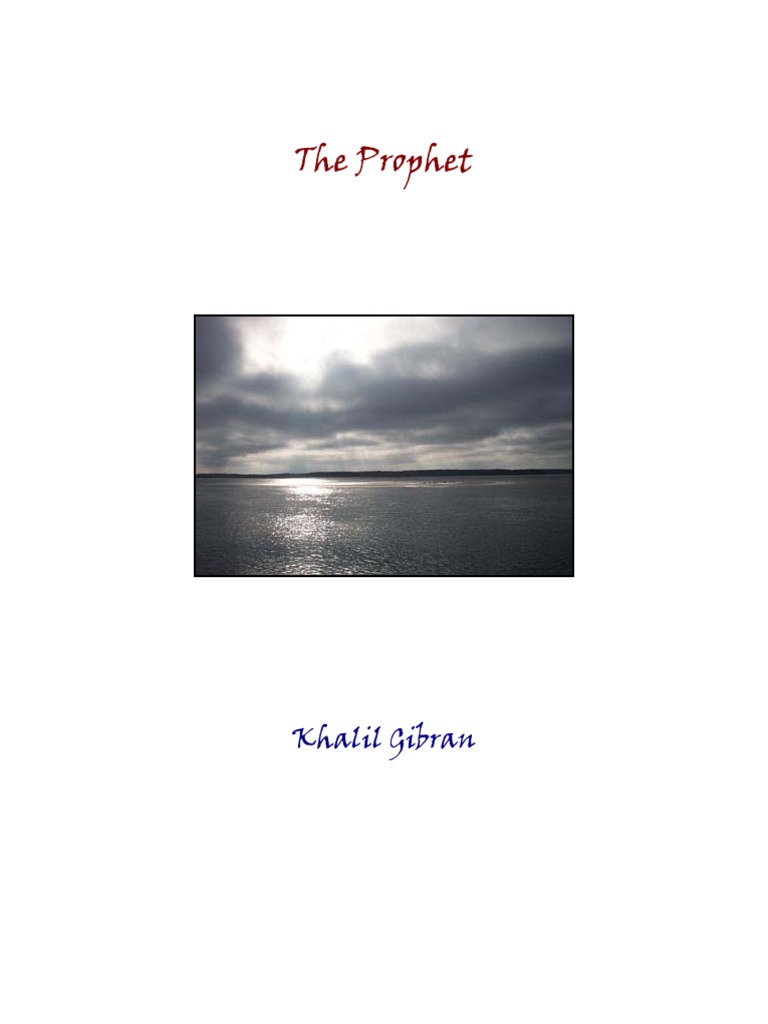In the explorative landscape of literature, certain texts resonate profoundly with philosophical and spiritual teachings. Among these is “The Prophet” by Khalil Gibran, a book that articulates a profound, poetic psychospiritual philosophy. This literary work is notable not only for its lyrical expression but also for its uncanny alignment with the Bahá’í teachings, a distinct faith that emphasizes unity, love, and the pursuit of truth. The interconnections between Gibran’s wisdom and the principles of the Bahá’í Faith beckon further exploration, revealing layers of understanding that undergird both of these remarkable doctrines.
At the heart of Gibran’s “The Prophet” is the figure of Almustafa, a seer who shares his insights on various aspects of life, encompassing themes such as love, freedom, and spirituality. Similarly, Bahá’í teachings impart wisdom about these themes, fostering the inherent unity of humanity. This juxtaposition of Gibran’s prose with Bahá’í principles invites an examination of how both systems explore the interconnected nature of human existence and the divine.
A prominent theme in both “The Prophet” and Bahá’í teachings is the paramount importance of love. Gibran’s reflections on love illustrate it as an ennobling, transcendental force that binds individuals together. His memorable assertion that “love knows not its own depth until the hour of separation” resonates with the Bahá’í perspective that love is fundamental to understanding the oneness of humankind. In the Bahá’í context, love is not merely an emotion; it is an active principle, described as the supreme law that governs human relations. This shared emphasis on love serves as a foundation for interstellar unity, fostering an atmosphere where collaboration supersedes discord.
Moreover, Gibran addresses the concept of selflessness, advocating for a relinquishment of egocentric desires in favor of collective well-being. The Prophet’s exhortations to serve humanity echo Bahá’í teachings that emphasize altruism, selfless service, and the importance of community engagement. The Bahá’í Faith posits that the true purpose of human life extends beyond material gain, encouraging followers to contribute to the greater good of society. In this light, Gibran’s verses heighten the dialogic interplay between individual aspirations and collective responsibilities, echoing the Bahá’í call for a spiritually and socially responsible existence.
The pursuit of knowledge is another ideal underscored in both Gibran’s and Bahá’í writings. Gibran asserts that wisdom and understanding can only emerge through patience and introspection. This pursuit mirrors the Bahá’í commitment to education as a means of spiritual development and societal advancement. The Bahá’í Faith champions the acquisition of knowledge, urging its followers to cultivate their minds and contribute to humanity’s collective intellectual heritage. This shared belief underscores a fundamental truth: the more enlightened individuals become, the greater their capacity to effectuate positive change in the world.
Gibran’s reflections on spirituality offer yet another parallel. In “The Prophet,” he expresses the notion that divine presence permeates all aspects of life. This perspective aligns seamlessly with Bahá’í teachings about the multifaceted relationship between the divine and humanity. Bahá’ís believe that all religions share a common essence, revealing successive manifestations of divine wisdom. Just as Almustafa speaks to the holistic nature of existence, Bahá’í doctrine embraces the interconnectedness of all souls and spiritual teachings, presenting a vision of unity that transcends religious boundaries.
Furthermore, the notion of harmony, pivotal in both Gibran’s work and Bahá’í principles, merits deeper scrutiny. Gibran illustrates the necessity for balance in human relationships, emphasizing that discord and strife arise from a lack of understanding and compassion. This echoes the Bahá’í ideal that advocating for harmony and peace is not only a moral choice but a vital necessity for the progress of civilization. The call for unity—one of the hallmark doctrines of the Bahá’í Faith—underscores Gibran’s cryptic yet profound assertion that “your soul is oftentimes a battlefield.”
In examining Gibran’s dialogue on individuality and society, we find profound parallels to the Bahá’í emphasis on personal agency coupled with collective welfare. Gibran articulates the tension between being true to one’s inner self and adhering to societal norms. Bahá’í teachings embrace this complexity, advocating for a recognition of individual rights while simultaneously emphasizing that individual fulfillment is inexorably linked to the well-being of the community. This dual commitment to freedom and responsibility encapsulates a critical element of both literary and spiritual traditions, suggesting that genuine liberation arises from understanding and fulfilling one’s role within the vast tapestry of humanity.
In light of these explorations, it becomes evident that Khalil Gibran’s “The Prophet” resonates deeply with the Bahá’í Faith, striking chords of love, selflessness, knowledge, spirituality, harmony, and individuality. The intricate weave of these themes encourages readers to delve beyond immediate interpretation, uncovering the shared commitment to human unity that these works convey. Ultimately, the resonance of Gibran’s poetic expressions with Bahá’í principles presents a rich terrain for contemplation, fostering a greater understanding of the paths leading toward a collective spiritual awakening. In a world increasingly divided, the messages embodied within both “The Prophet” and the Bahá’í teachings urge humanity towards a more harmonious existence, championing love and understanding as the cornerstones of progress.
